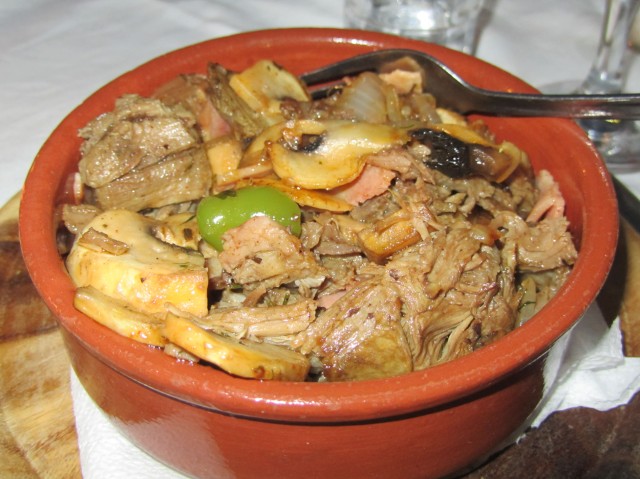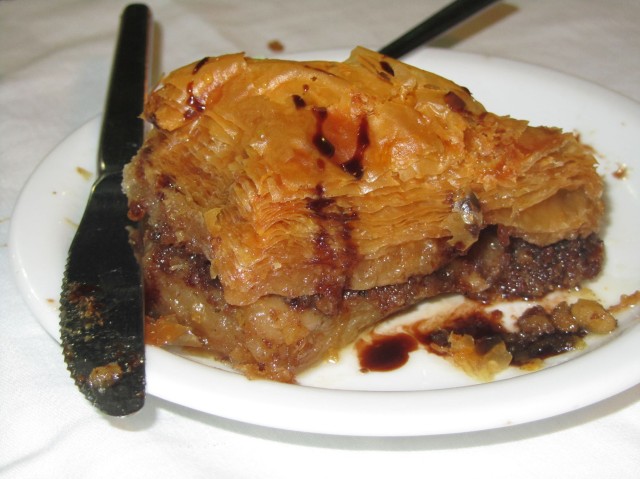
On a hot summer evening in the Aegean olives have a zingy, comforting flavour that’s missing at home where they are merely really good. The same goes for watermelon. Served up free at many restaurants what is often a tasteless fruit in Scotland oozed honey sweet juice, and served chilled was wonderfully refreshing. Husband even made a drink with it and iced water.


Olives are a staple part of lives in many Mediterranean and Aegean countries, not only to eat and use in oil but also as a base for soaps and a variety of creams, lotions and potions developed over the centuries since the ancients doused their bodies with olive oil in bathhouses, and several thousand years before that.

Probably one of the best, if not the best, fillet steak I’ve ever had.
I was into my teens before I came across even a mention of olives, and then they were treated as something of a joke – a bit like garlic. A peculiar taste that had rolled across the Channel when some customs officer’s back was turned, landing up in a few high class clubs and restaurants. I was into my twenties before I first tasted them, on a holiday that was full of firsts. The first time I’d flown for a start. We were in what was then known as Jugoslavia. How the world has changed since then!

Interesting glass plate and fabulous ravioli, unfortunately there was only enough for a starter and the waiter didn’t feel I should have mentioned the fact. We didn’t return to that restaurant – lots of others to chose from.

This was husband’s mixed grill at the same restaurant, which cost less than my teensy plate of pasta. Luckily husband had so much he gave me some of his to make up for my lack of food. We didn’t hang around for a sweet but paid and walked along the road to an Italian ice cream place where we enjoyed a wonderful ice.
Now fridge and cupboards have numerous jars of olives, and when abroad olives and bread are our favoured starter to a meal. My family have got used to a mother who asks for some good olives rather than boxes of chocolates. But I have to admit, that when eaten in the sun they do have an additional attraction.

We couldn’t be in Greece and not have moussaka – and very good it was too.
Surprisingly, lamb in Pefkos was plentiful and fairly cheap when eaten in restaurants, as well as wonderfully sweet. Often it was served traditionally, slow cooked like Kleftico, or with bacon, or in a rosemary sauce.

Not unlike kleftico – a traditional dish of succulent leg of lamb, slowly cooked – but this was lamb with bacon. Delicious.

Lamb with rosemary sauce. Many vegetables in Pefkos were few and far between, probably because much was imported from mainland Greece, so it wasn’t uncommon to get what were obviously frozen ones. Nor was it uncommon to have rice and potatoes with meat. Again possibly because potatoes have to be brought it, or maybe this is just a tradition.
Sometimes it was grilled as chops, or served on skewers. But always it was good.

Lamb on skewers served with yogurt, potatoes and and pitta bread with a mixture of onions and peppers, and dressed with an olive. Wonderful.

Five lamb chops. I thought I’d never eat my way through them – but I did, and enjoyed every last bite.
My surprise arose from the habitat. When we looked at the bare rocks of the hills, with little vegetation, and no sign of sheep, we wondered where the lamb came from, but were assured there were plenty in the south of the island. In the Scottish Borders we have rolling hills, green grass as far as the eye can see, and millions of sheep. Yet we eat little of it (presumably much is exported) and when we do buy it the cost is steep, with restaurants charging much more than in Rhodes. So I made the most of it and ate my way through many of the lamb dishes available.

We were told that the spare ribs on the menu weren’t pork but goat, so we thought we’d try it. Cooked on a grill they were very tasty.
Goats we did see from the bus, munching sparse clumps of dry vegetation amongst the rocks. We had the chance to taste goat one evening, cooked on the grill, and went for it. Husband thought it tasted like a cross between beef and lamb, I thought it more like pork. Whatever, it made a main course with a difference.

Husband had grilled sea bass one evening. Not being particularly fond of fish I didn’t join him – just as well as the amount of bones even he found daunting.

Greek salad complete with a chunk of Feta cheese.

Another evening we opted for prawn salad as a starter, the prawns coming from the island of Symi which we we had visited in October.

And then there was Spitaki restaurant’s own dolmades. A mix of pork and lamb with nuts and other ingredients wrapped in vine leaves that grew in the owner’s garden, and served with yogurt and a black olive.
Baklava, like olives, has a long history, its origins claimed by both Turkey and Greece. Layers of Filo pastry filled with a mixture of chopped, sweetened nuts and drizzled with syrup or honey. It should be sickly sweet, and it was when I’ve eaten it previously, but the baklavas I tasted in Pefkos, though all slightly different, were gorgeous and helped replace energy lost in the heat.

Gorgeous – and I say that as someone who prefers olives to chocolates!
Sometimes it was served with a scoop of ice cream, sometimes on its own or with a few artistic swirls of garnish. At Spitaki restaurant it was occasionally served with a sparkler for an extra zing. Very seventies, but it still made me laugh and feel special.

The very sight of this transports me back to warm evenings under the bougainvillea.
As a change from baklava one evening I was given a similar filo pastry desert but instead of nuts the filling was a sort of custard. Good, but not as moreish as the nuts variety.

Oof! My mouth is watering.
On another evening I was told a special sweet was being made for me. Again, I don’t know the name, but have made variations several times since returning home as it couldn’t be simpler or more delicious. Yogurt (I use the Turkish yogurt from our supermarket as it has the creamy flavour of what I had in Pefkos) drizzled with runny honey and topped with walnuts. I have substituted nectarines with some crushed almonds for the nuts, and it still tasted extraordinarily good.

The local wine was extremely drinkable.
Our meals were accompanied by a carafe of local wine, usually dry red but occasionally we opted for white. And a bottle of water. And one evening we were presented with glasses of Masticha of Chios Liqueur courtesy of the restaurant.
One final ingredient that made all these dishes and meals so unforgettable: the warm, friendly people who greeted us and brought the dishes to our tables. A return to the restaurant brought smiles, waves, chatter about the dishes, how they were cooked, the ingredients, gravitating to stories of families and villages, sons and jobs, travels and family homes. Their openness and generosity will long be remembered.



What an appetising post! I think I’ll have to come back to enjoy the photos and descriptions again. Love that glass plate under the ravioli. Intrigued by the custard dish. Is that honey drizzled over it? Every single dish looks fabulous.
Thanks, Chris. Yes, the plate was beautiful – just a pity the ravioli portion was so meagre.The warmth and surroundings added their own charm to make for a memorable time. The custard dish is actually yogurt with honey drizzled over and topped by walnuts. I’ve made it at home using Turkish yogurt from the supermarket which is less acidic and more creamy then other yogurts, and as some of the family have an aversion to walnuts I’ve used nectarines and slivers of almonds. I found it quite amazing how the honey and yogurt combined into a delicious taste, very creamy but not too heavy. We’ve laid in supplies of runny honey to keep us going experimenting with different ways to serve the dish.
Wow! What fun. Feels a bit like I just did the trip with you. While in Greece once we ended up in a small village, inland Naxos, at a restaurant eating rabbit stew…the memories are now flooding back. Thanks for sharing and inspiring me to explore old experiences again, through your new ones!
Well you know Greece and the Greek way of life can be very beguiling, building a cache of memories to be drawn on to cheer and lift spirits. It wasn’t a la carte dining – to my mind it was better. Unpretentious, well cooked local food, made with fresh local ingredients to give visitors a real flavour of where they are staying. It’s thoughtfully made food mixed with atmosphere and friendliness. What could be better!
What delicious food! Nothing beats zingy, salty olives on warm summer days. My favorites include nocellara and kalamata.
Yup, olives and a glass or two of wine and perhaps some good cheese, ideally in surroundings that send a thrill up your spine. Heaven!
What variety of dishes! One seems more delicious than another. Congratulations by the travel.
I like to travel, though increasingly find the journey frustrating – the standing in queues, the waiting, being crushed into planes, more queues, hanging around waiting for luggage. My travels have only been around Europe. Would love to have ventured further but… As well as scenery, I love sampling the food – the exception being fish. I’ve never liked fish, and even now eat little of it. So many of the great Mediterranean dishes will go untasted by me. However, lots of meat, vegetables and fruit to enjoy. And memories of warm sunny days to keep me going over the winter.